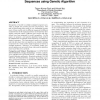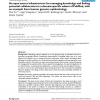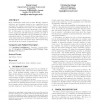267 search results - page 20 / 54 » Artificial Data Sets Based on Knowledge Generators: Analysis... |
GECCO
2006
Springer
14 years 8 days ago
2006
Springer
Recognition of motifs in multiple unaligned sequences provides an insight into protein structure and function. The task of discovering these motifs is very challenging because mos...
BMCBI
2007
13 years 8 months ago
2007
Background: Identifying relevant research in an ever-growing body of published literature is becoming increasingly difficult. Establishing domain-specific knowledge bases may be a...
ECAI
2008
Springer
13 years 10 months ago
2008
Springer
In the drive to improve patient safety, patients in modern intensive care units are closely monitored with the generation of very large volumes of data. Unless the data are further...
KDD
2008
ACM
14 years 9 months ago
2008
ACM
Selection of genes that are differentially expressed and critical to a particular biological process has been a major challenge in post-array analysis. Recent development in bioin...
KDD
2005
ACM
14 years 9 months ago
2005
ACM
Many classification tasks, such as spam filtering, intrusion detection, and terrorism detection, are complicated by an adversary who wishes to avoid detection. Previous work on ad...



